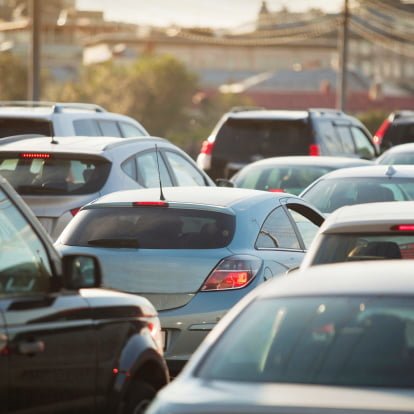Cities could be the road to weight gain

Traffic Jam
Live in the inner cities? Did you know you could be losing the fight against the flab before you even think of ordering a giant delivery pizza or curry?
This is according to new Scandinavian research, which suggests that living by a main road increases your chances of piling on the pounds.
How so?
Well, Sweden’s Karolinksa Institute found that extra traffic noise produces extra stress in our bodies.
And our bodies naturally respond to this by – yes, you’ve guessed it – storing additional fat.
This survival response also applies, although to a lesser extent, to living near a loud train line (second) or airport (third), the Swedish scientists discovered.
So what sort of numbers are we talking about?
A noise hike of just five decibels. That’s sufficient to trigger this reaction, given a typical noise reading of 45 decibels.
The link was made most commonly to expanding girths among people up to the age of 60.
But the reverse was true too. This means that country dwellers who reside in peaceful rural regions lose weight more easily than their city cousins.
That’s down to the reduced amounts of traffic noise-related stress levels which they experience.
What the experts say
Research leader Andrei Pyko says road traffic trumps all other transport-related noise when it comes to storing extra fat because of additional stress levels.
Traffic noise-related ailments include sleeplessness, cardiovascular problems, stress hormone rate alterations and annoyance.
Dr. Pyko said that such sounds are becoming increasingly common because of the shift to city living.
But this appears to be the tip of the iceberg
Already, over half our planet’s 7 billion population reside in urban districts, with many of them boasting 10-million-plus inhabitants, such as Delhi, Tokyo and Mexico City.
But the UN, in a report published last year, predicts that this percentage is due to balloon over the next 30 years.
It forecast that city dwelling will grow from 3.5 billion dwellers to over 6 billion.
Every decibel counts …
So just how little is a five-decibel change? The following noise levels should give you some idea:
20 decibels – quiet lounge
40dBs – quiet conversation
45dBs – average noise
50dBs – average office noise
70dBs – busy street
90dBs – a heavy truck
110dBs – power tools
120dBs – aircrafts on an airport runway



